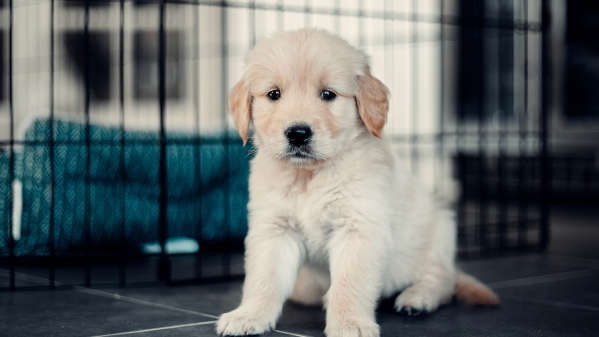It's very common for puppies to develop diarrhea at some point in their young lives. The cause for the diarrhea could be something simple, like eating something they got their nose into and probably shouldn’t have, or a more serious cause like an infection. It's upsetting to see your pup not feeling well, so trying to figure out the reason why your puppy has diarrhea and knowing what to do next is very important.
Of course, there’s no substitute for consulting a vet if you’re concerned about your pet’s health. But it's important to be knowledgeable about what your pup is experiencing and how you can help relieve their discomfort.
Causes of diarrhea in puppies
Let’s run through some reasons why your puppy might be suffering from diarrhea. While this is a relatively common problem to run into, there are some puppy diarrhea causes that are more serious than others. If you're worried about your puppy, you can always speak to a vet at Pawp. We know how important it is for you to be able to find answers quickly, and that’s why our vet team offers 24-hour, around-the-clock telehealth care for your pet.
Common causes of puppy diarrhea include:
Viral and bacterial infections
Internal parasites
Stress or anxiety
Dietary reasons
Viral and bacterial infections
Viruses and bacteria are potentially serious causes for diarrhea in puppies. Young puppies do not have a fully developed immune system and may not yet have had all of their vaccinations. This makes them more vulnerable to infections. If one of these is the cause, you will probably also see other changes and symptoms like a fever, lethargy and a loss of appetite. Viral and bacterial infections can get worse very quickly in puppies and need to be treated promptly by a vet to ensure the best possible outcome.
Internal parasites
Internal parasites are a common cause for diarrhea in puppies. Internal parasites include organisms like worms (roundworms, hookworms, whipworms and tapeworms), protozoa (e.g. Giardia) and coccidia. These can be acquired from a pup’s mother right after birth. In addition, your puppy can pick these up from infected water or even the ground while walking around outside.
Most of these causes can be treated very successfully by your vet with medication, but if you don’t treat them, there could be serious health repercussions.
Stress or anxiety
If you recently got your puppy home and they were separated from their littermates and mother, they are likely experiencing stress. This can be intensified due to unexpected smells, sounds, new foods, schedules, or other pets in your home.
One way that you can help your pup is by providing them with a predictable, regular schedule, including feeding and play times. Also make sure to provide them with a safe and quiet space where they can go relax for a while if they're feeling overwhelmed.
Dietary causes of puppy diarrhea
Diet plays a very important role in the development of diarrhea in puppies.
Your dog’s digestive system is still developing at their young age, which means that any sudden changes in diet can cause an upset of the balance in the gut. It's very important to do any diet changes gradually over at least 5 to 7 days to allow the gut to adapt to the changes and be able to optimally digest the new food.
Certain brands of food or ingredients in a specific diet might not be the right ones for your puppy and can also cause an upset gut. Your vet will be able to recommend special diets that will be a better match for your puppy if this seems to be the case.
Keep in mind that your new puppy could have gotten a hold of something they weren’t supposed to. Puppies can be rather curious, and are apt to ingest something that seems fascinating to them. This can be dangerous if your pet accidentally eats something that’s toxic to dogs.
Simply eating too much at once can also potentially cause an upset in the gut balance and result in diarrhea.
Treatment for puppy diarrhea
It's essential to try to find the cause for the diarrhea so you know what the next best step should be. If the diarrhea is accompanied by symptoms such as vomiting, poor or no appetite, lethargy, and weakness, the cause might be serious and your puppy should be treated by a veterinarian promptly.
Some cases of diarrhea can be relatively mild and self-limiting so that home treatment can be attempted to resolve the issue. These are the cases when the diarrhea has not lasted longer than 48 hours, the puppy is still eating and drinking, and has no other symptoms.
Hydration
Diarrhea can lead to dehydration and even more so in young puppies. One way to help prevent serious dehydration is to offer them some ice cubes. Diarrhea can remove a large amount of fluid and electrolytes from your puppy’s body, so you should be sure to replenish that. You can also add some extra water to their food to ensure they're taking in enough water.
Feeding a bland diet
Feeding a bland diet for 48 hours is a good way to ensure that your pup’s gut has a chance to rest and heal so it can go back to normal. Bland diets are diets that digest easily. Good options are lean meats like white meat chicken, lean beef, and turkey with some rice. You can add pumpkin puree to the food to help increase the fiber in the diet which can help the stools get back to normal faster.
Parasite treatment
Regular deworming is important for puppies, especially because they are so inquisitive and like to stick their noses into everything. Your veterinarian will be able to advise you on the best deworming schedule for your puppy depending on your circumstances.
Having regular stool checks done is also a very good way of ensuring your pup is free from intestinal parasites.
Probiotics
Probiotics are very good supplements for puppies with diarrhea. It helps to balance the gut, and in that way, can aid in getting the stool back to normal. Kaolin and Pectin can sometimes be added to the probiotics and will also be of great help for pups with uncomplicated diarrhea.
Prevention of diarrhea in puppies
It's not always possible to prevent puppy diarrhea. Their curious nature makes them more prone to sniffing things out and trying to sample them. There are, however, some things that are under your control that you can do to try to prevent diarrhea in your puppy.
Feed a good quality balanced diet.
Do diet transitions slowly. When you change from one brand of food to another or even just to a different formulation, it's best to do it over a period of at least 5-7 days.
Make sure your pup cannot get into the garbage can or any other areas where you dispose of food. Puppies will try anything, including rotten or spoiled food. Do not feed them human food from the table, as their digestive systems often cannot handle the spices, salt, and fat in our food and some substances can even be toxic to them.
Keep your puppy’s environment clean and safe and stress-free and try to stick to a predictable schedule, especially in the beginning when the puppy is new to your home.
Vaccinate your puppy as directed by your veterinarian. Some of the most dangerous causes for diarrhea can be prevented by vaccinating your puppy, so this is something that should not be overlooked.
A tip from Pawp veterinarian
When discussing the causes of puppy diarrhea, Pawp veterinarian Dr. Laura Robinson has this important note, “Diarrhea is never normal for a puppy, just like it is never normal for us. There are many causes for diarrhea in puppies, but if you are worried about your puppy’s bowel movements, then we advise making an appointment with your veterinarian. If in doubt, it is always worth a visit to your vet, especially if your dog is also exhibiting other symptoms such as vomiting, not eating, or acting lethargic.”

Reviewed and fact-checked by
Dr. Mari, DVM at Pawp
